

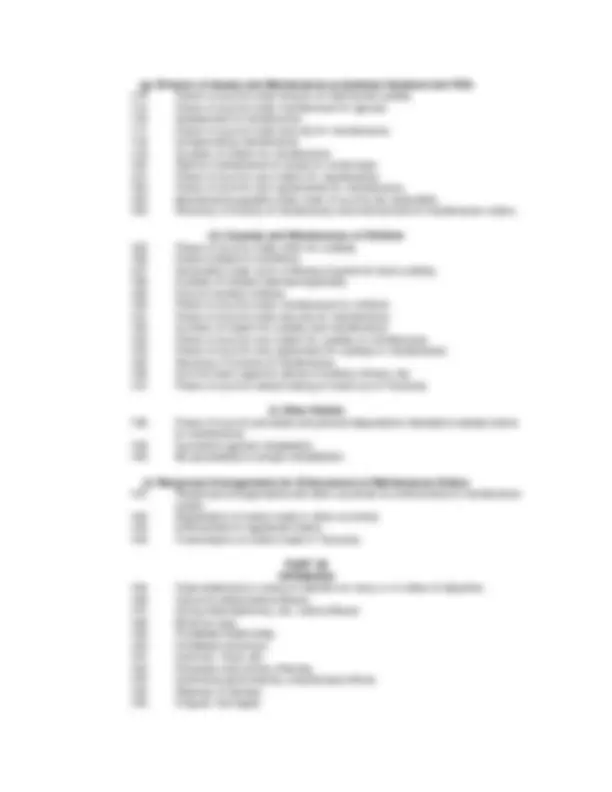
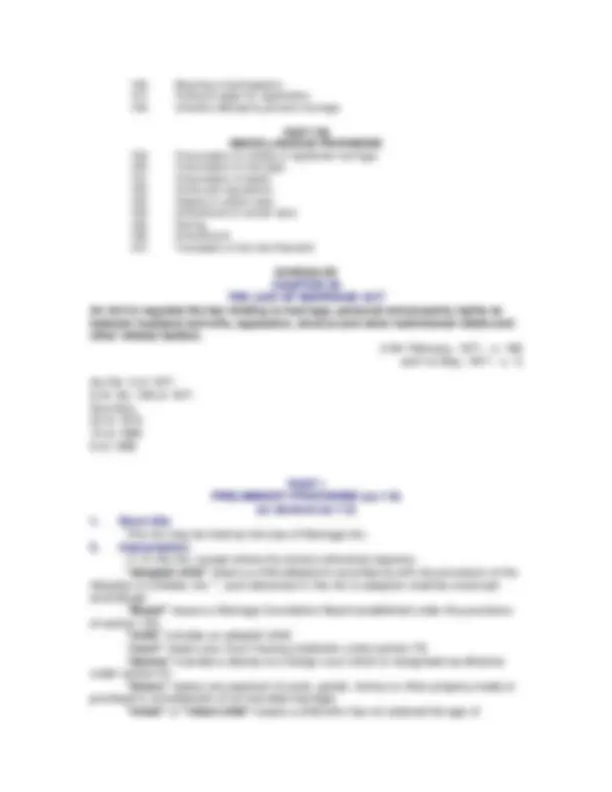
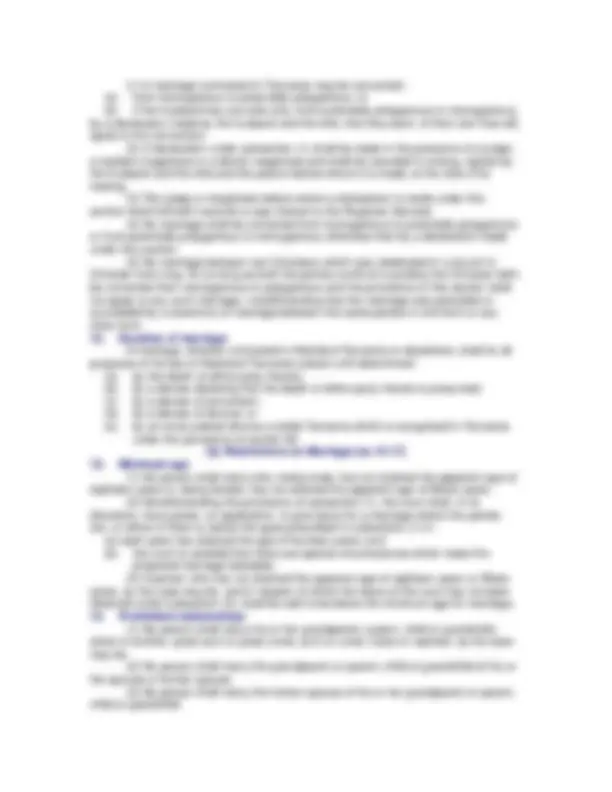
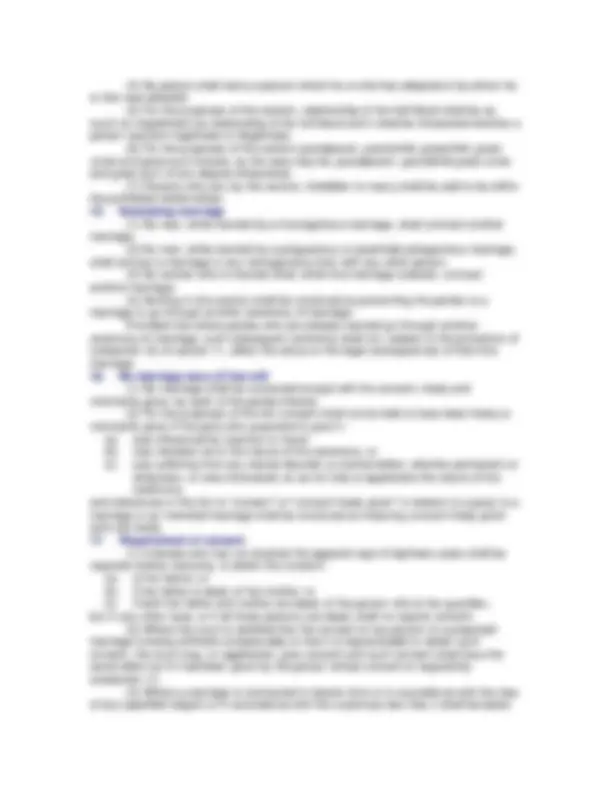
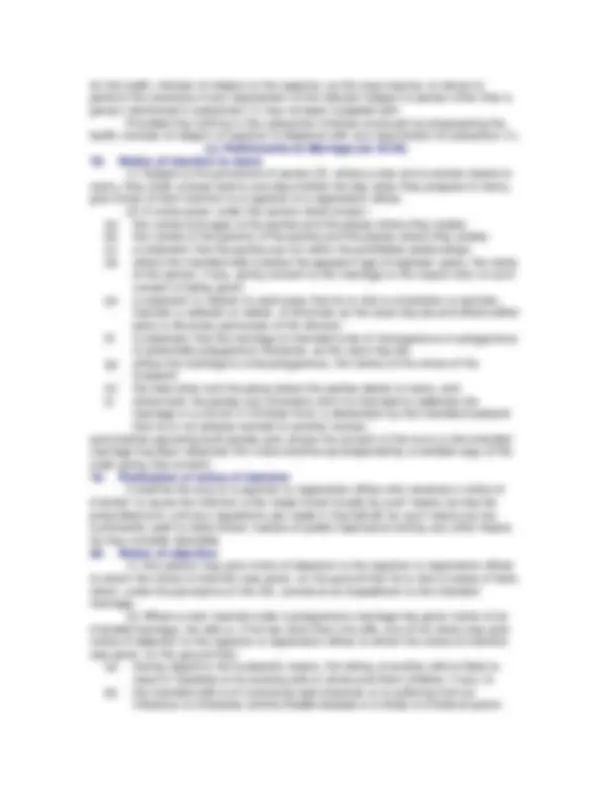
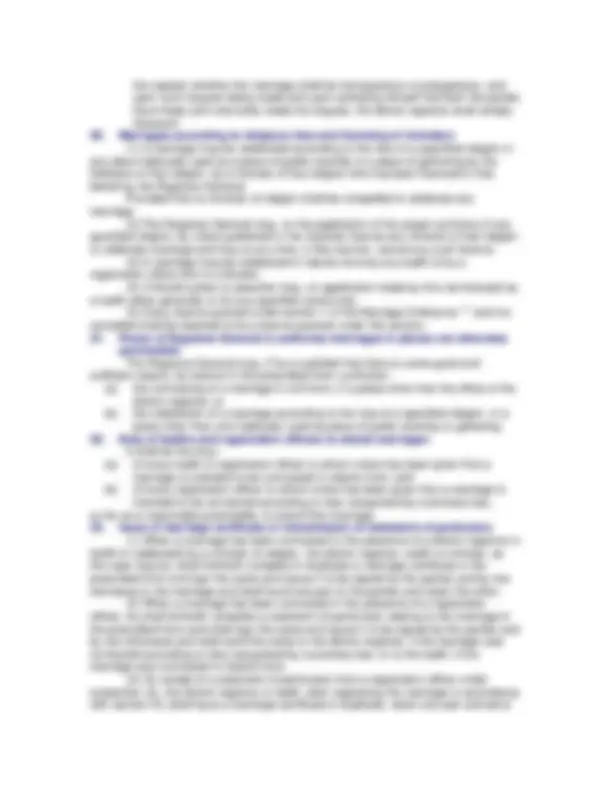
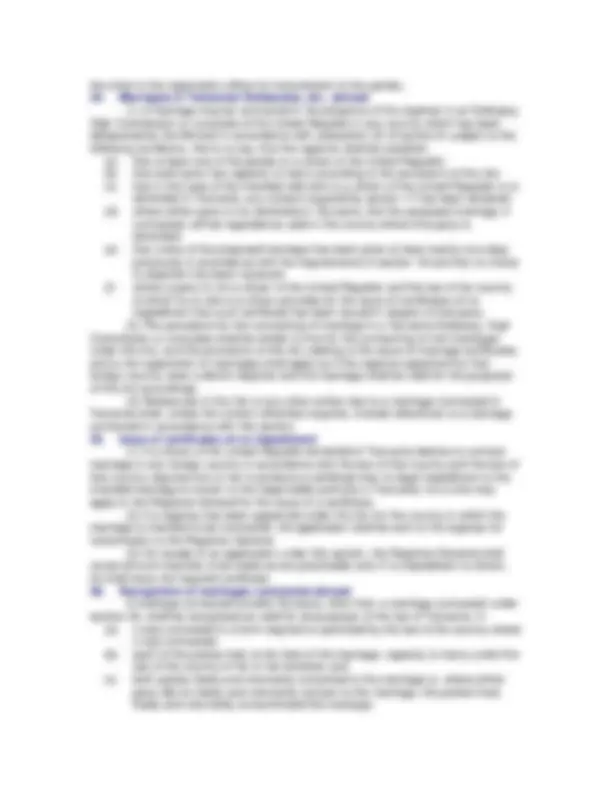
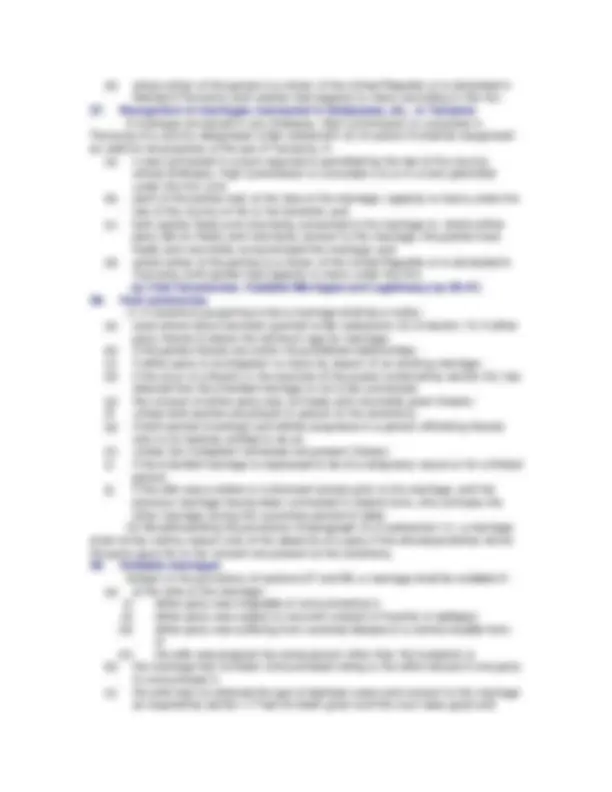
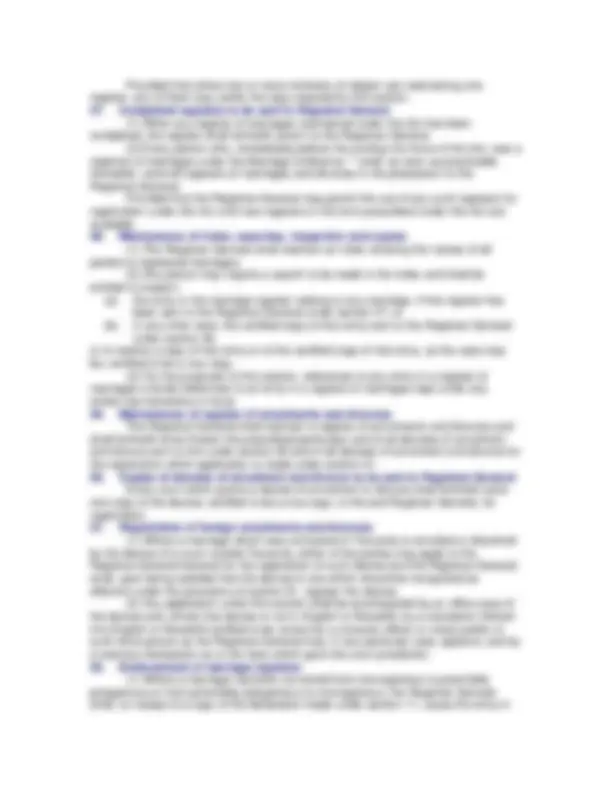
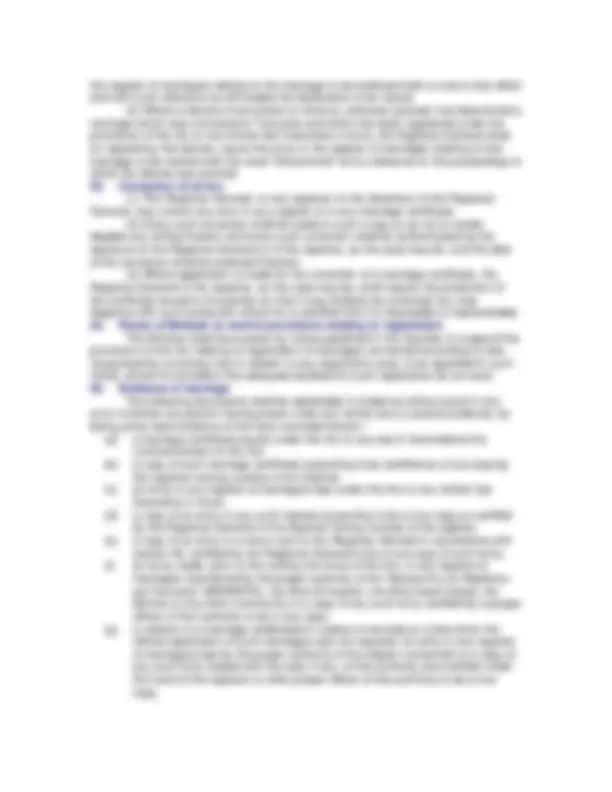
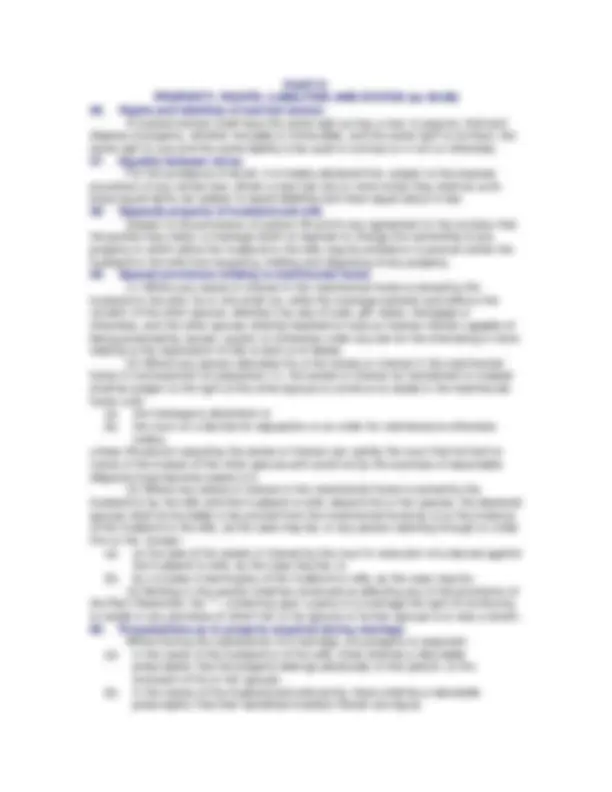
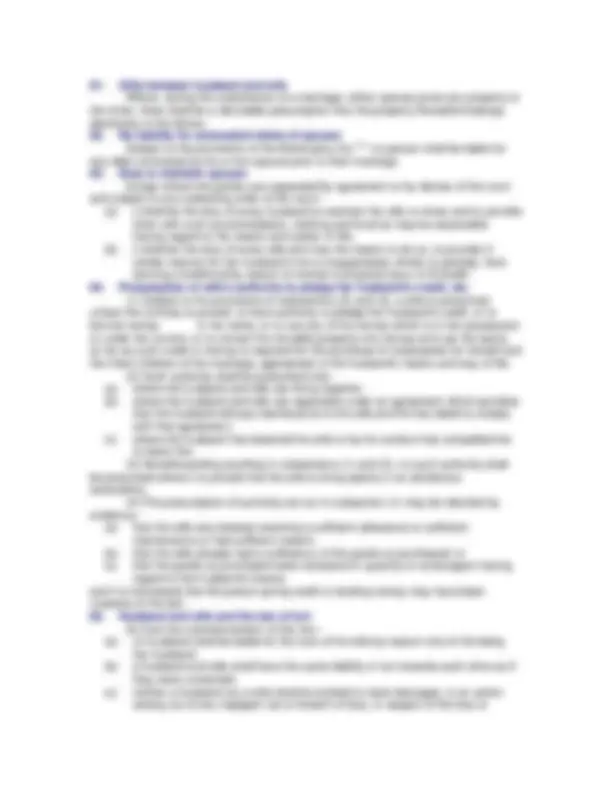
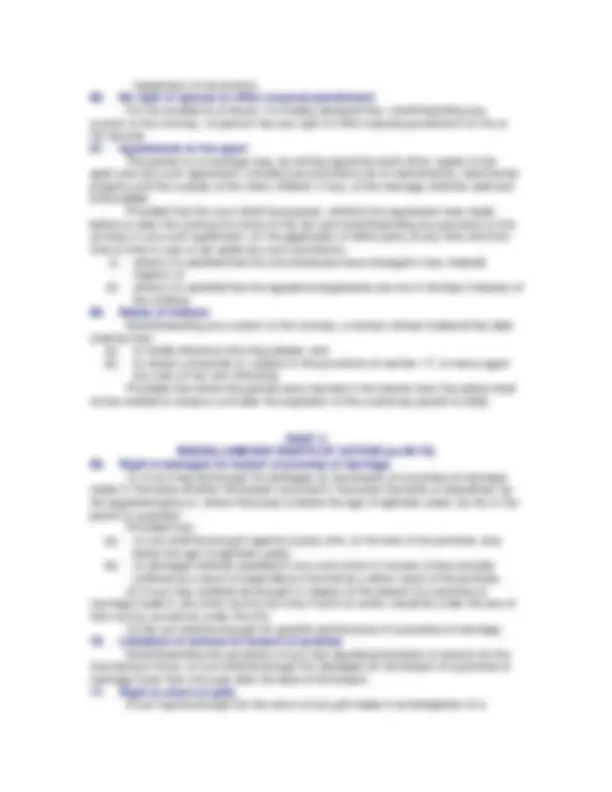
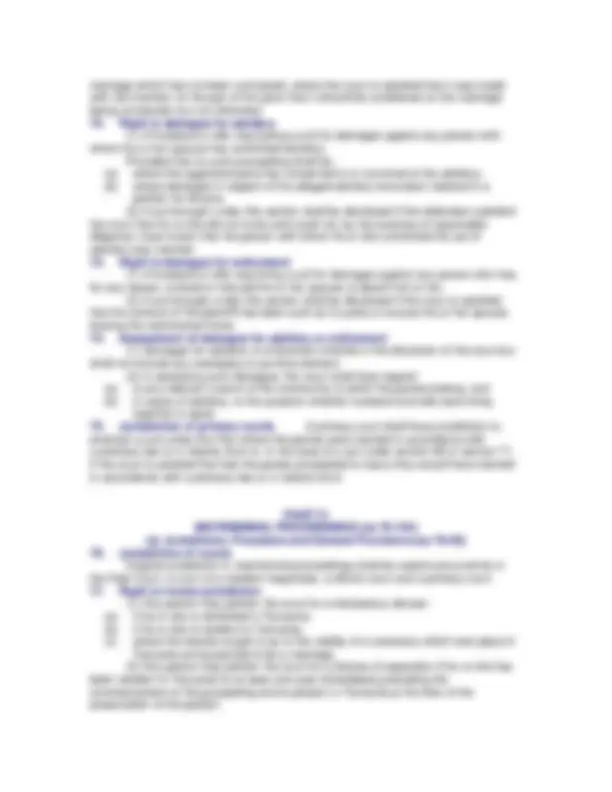

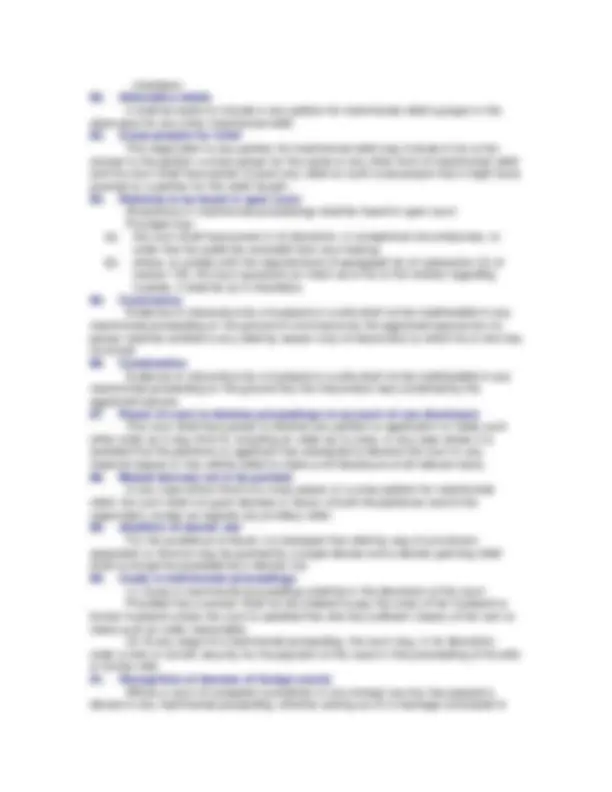
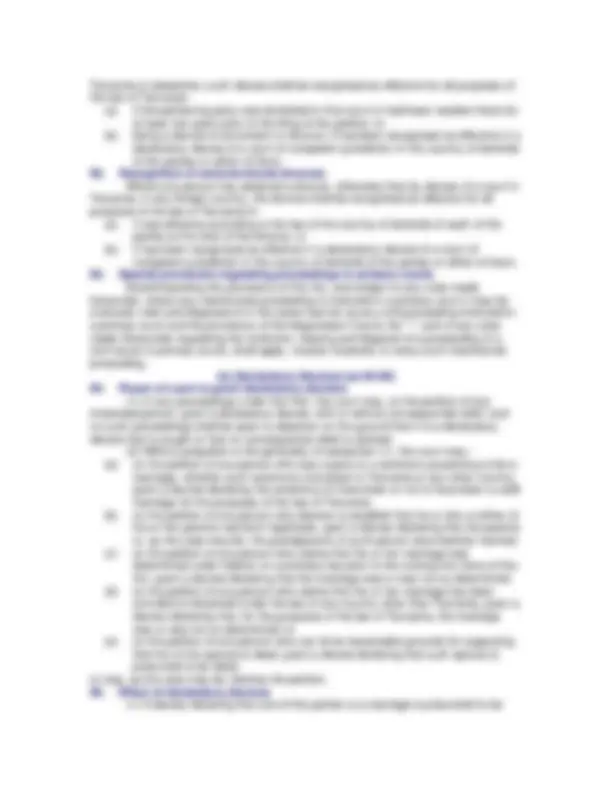
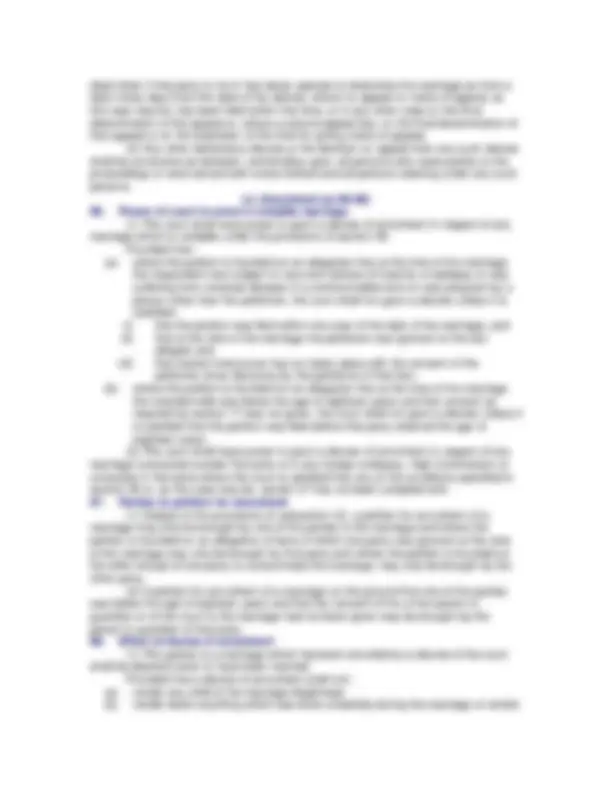
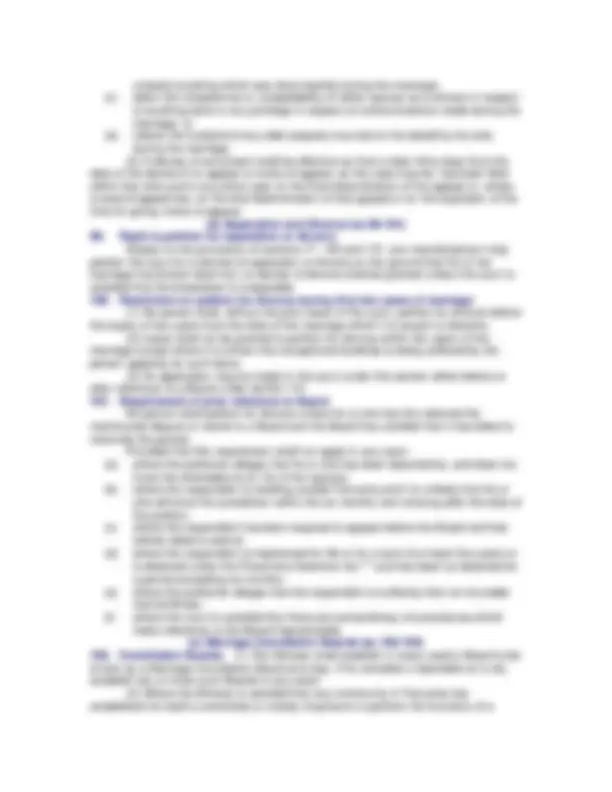
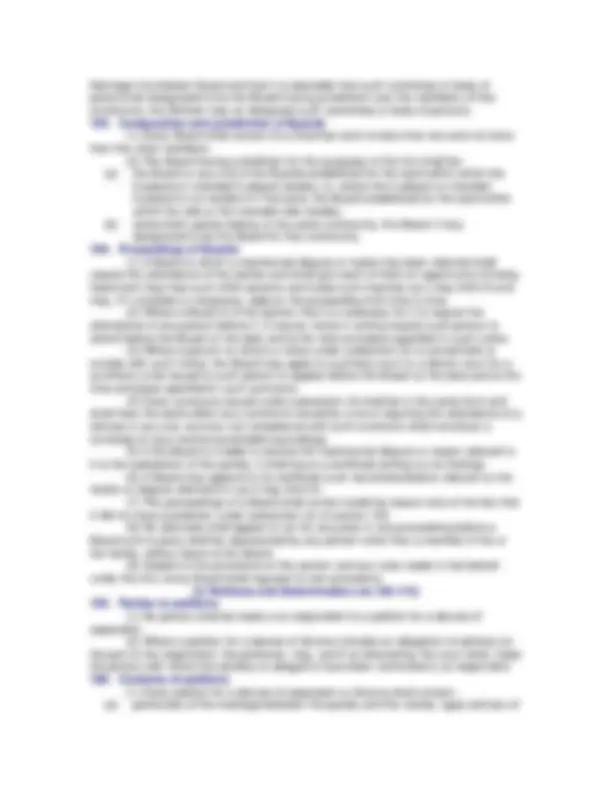
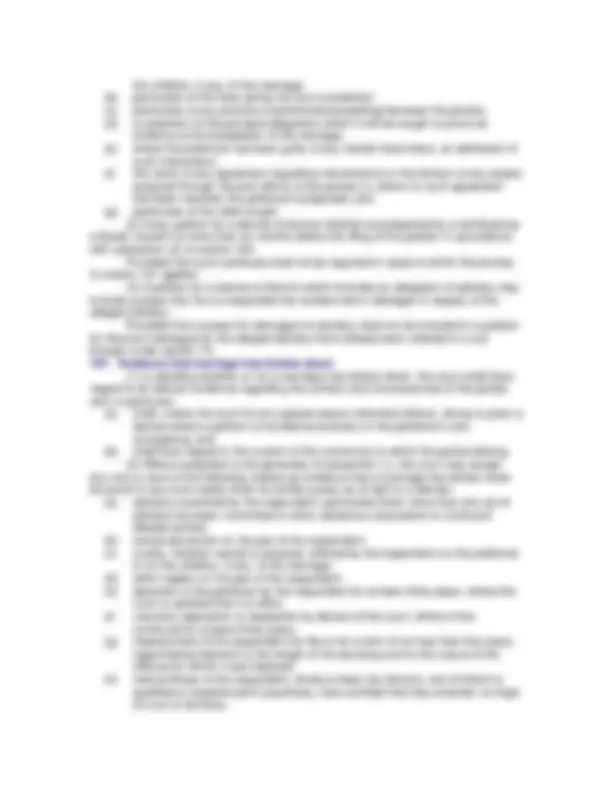
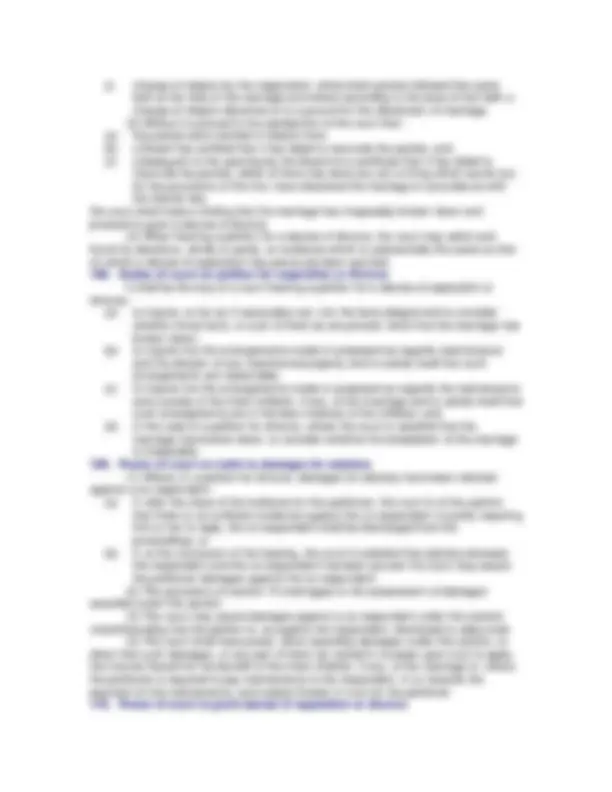
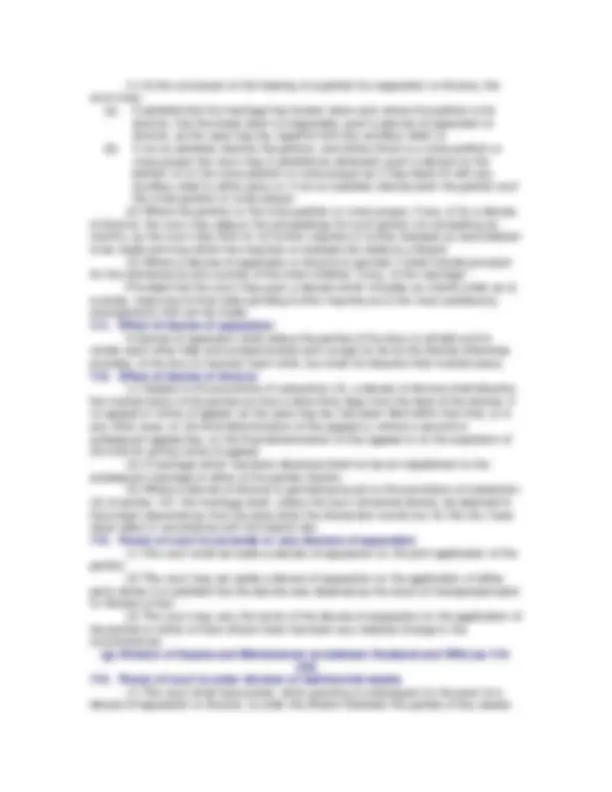
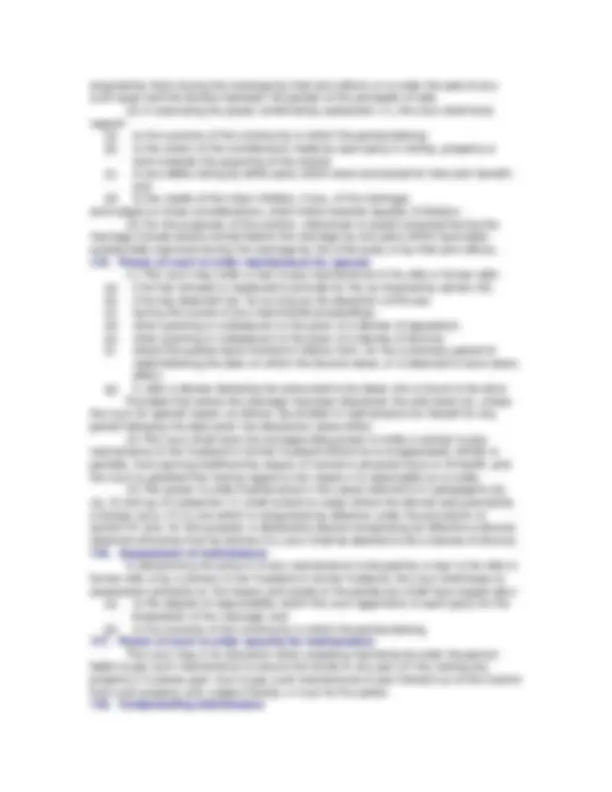
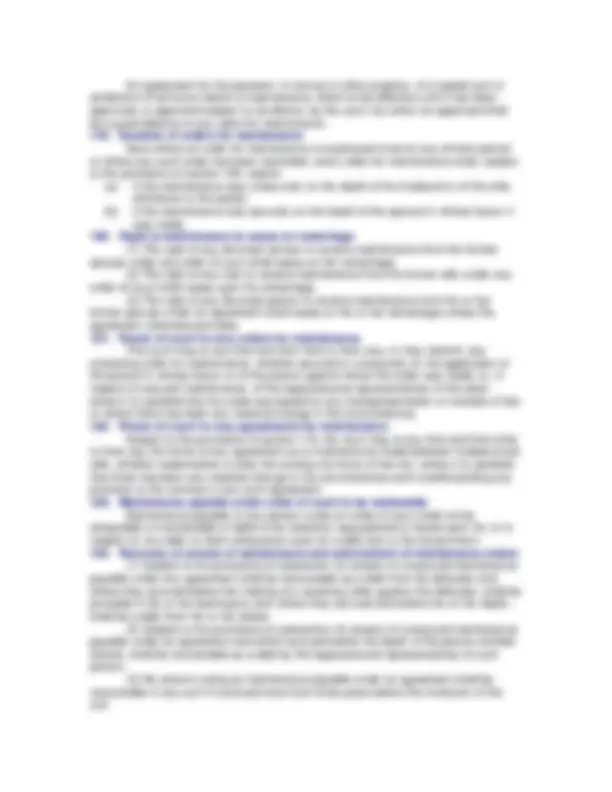
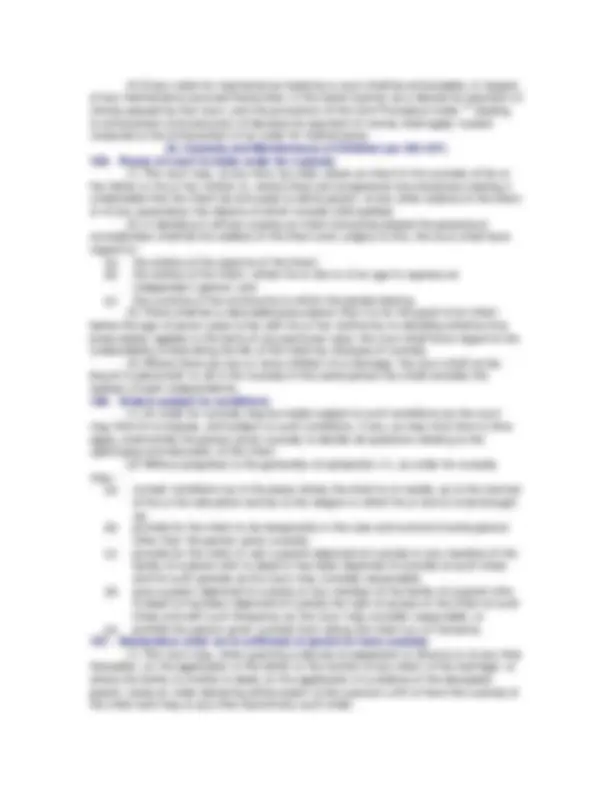
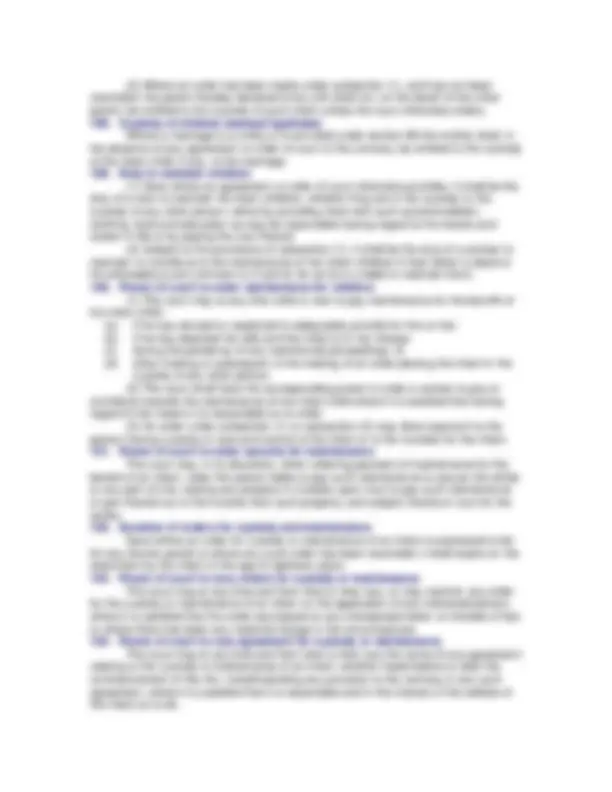
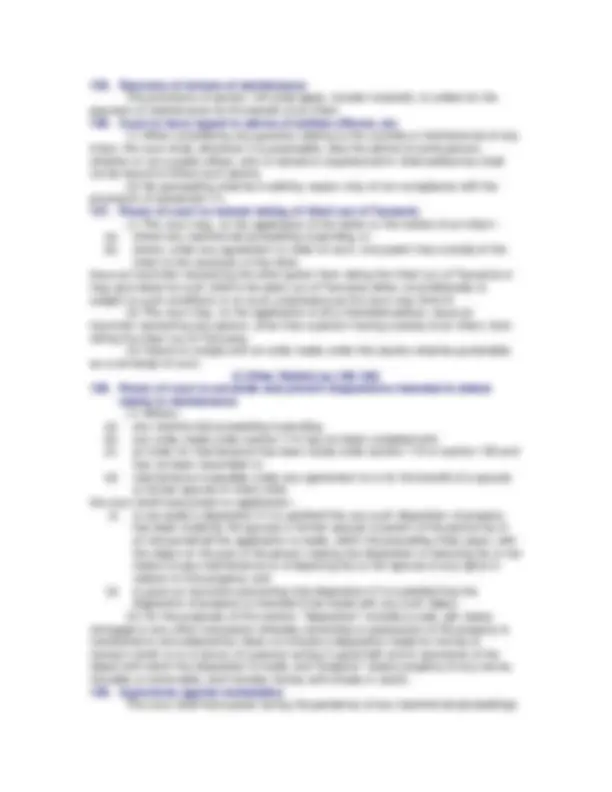
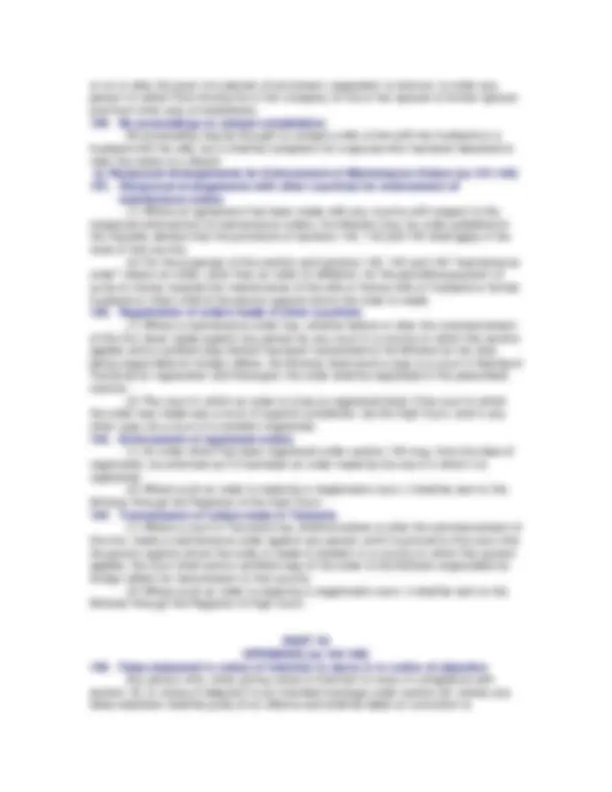
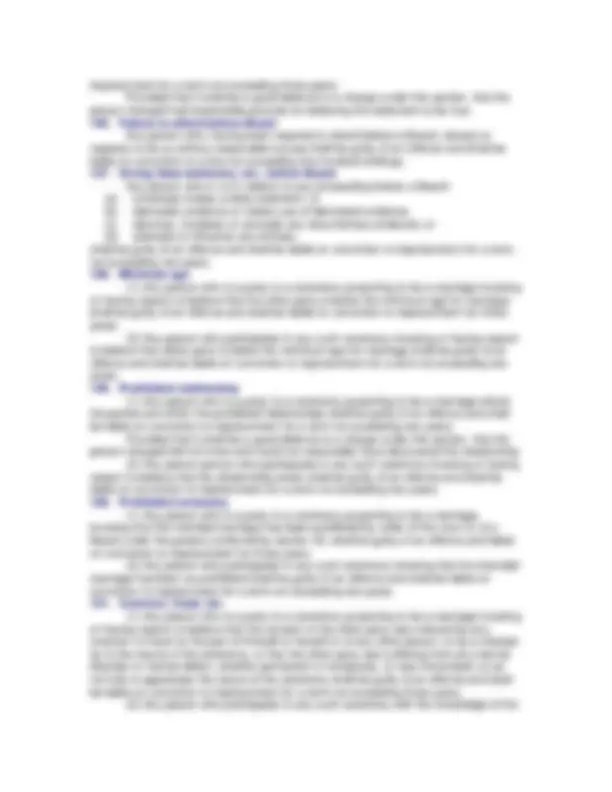
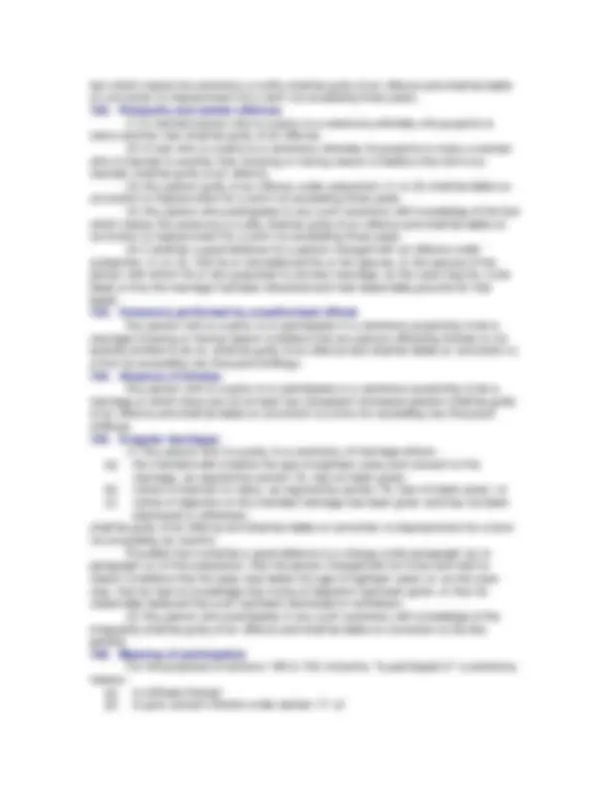
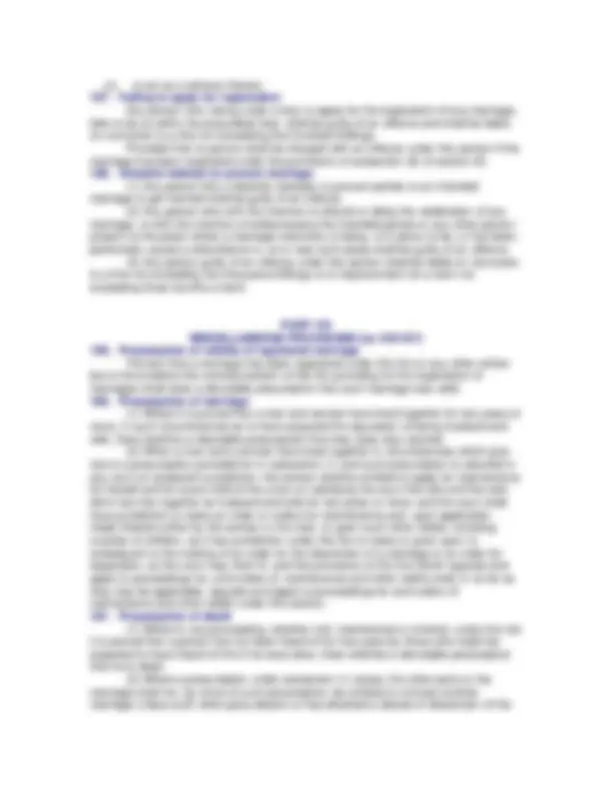

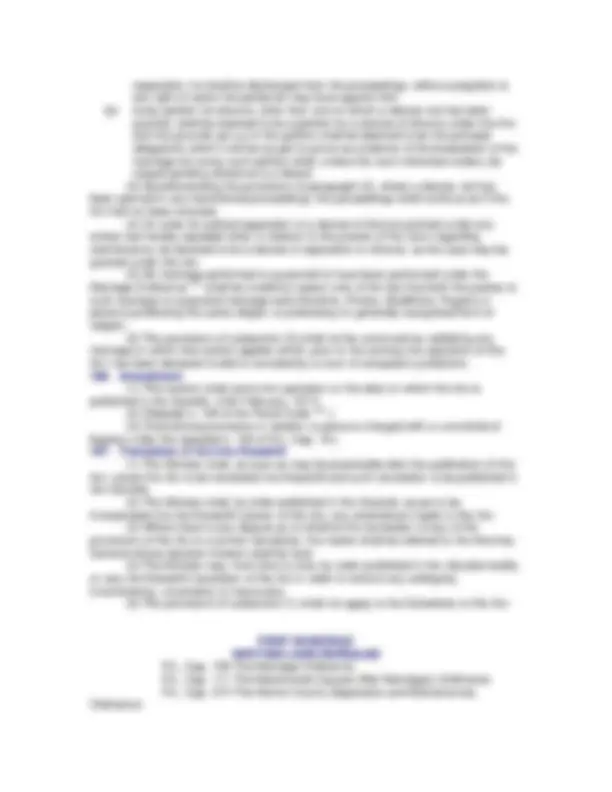



Study with the several resources on Docsity

Earn points by helping other students or get them with a premium plan


Prepare for your exams
Study with the several resources on Docsity

Earn points to download
Earn points by helping other students or get them with a premium plan
Community
Ask the community for help and clear up your study doubts
Discover the best universities in your country according to Docsity users
Free resources
Download our free guides on studying techniques, anxiety management strategies, and thesis advice from Docsity tutors
Tanzania law of marriage act Dealing with family laws of tanzania
Typology: Essays (university)
1 / 44

This page cannot be seen from the preview
Don't miss anything!





































ARRANGEMENT OF SECTIONS Section Title PART I PRELIMINARY PROVISIONS (a) General
(b) Appointments
PART II MARRIAGE (a) The Nature of Marriage
(b) Restrictions on Marriage
(c) Preliminaries to Marriage
(d) Contracting of Marriage
(e) Void Ceremonies, Voidable Marriages and Legitimacy
PART III REGISTRATION OF MARRIAGES, ANNULMENTS AND DIVORCES AND EVIDENCE OF MARRIAGE
PART IV PROPERTY, RIGHTS, LIABILITIES AND STATUS
PART V MISCELLANEOUS RIGHTS OF ACTION
(g) Division of Assets and Maintenance as between Husband and Wife
(h) Custody and Maintenance of Children
(i) Other Reliefs
(j) Reciprocal Arrangements for Enforcement of Maintenance Orders
PART VII OFFENCES
PART VIII MISCELLANEOUS PROVISIONS
SCHEDULES CHAPTER 29 THE LAW OF MARRIAGE ACT An Act to regulate the law relating to marriage, personal and property rights as between husband and wife, separation, divorce and other matrimonial reliefs and other related matters. [12th February, 1971 - s. 166 and 1st May, 1971 - s. 1]
Act No. 5 of 1971 G.N. No. 109 of 1971 Acts Nos. 23 of 1973 15 of 1980 9 of 1996
PRELIMINARY PROVISIONS (ss 1-8) (a) General (ss 1-2)
1. Short title This Act may be cited as the Law of Marriage Act. 2. Interpretation (1) In this Act, except where the context otherwise requires– "adopted child" means a child adopted in accordance with the provisions of the Adoption of Children Act i*, and references in this Act to adoption shall be construed accordingly; "Board" means a Marriage Conciliation Board established under the provisions of section 102; "child" includes an adopted child; "court" means any Court having jurisdiction under section 76; "decree" includes a decree of a foreign court which is recognised as effective under section 91; "dowry" means any payment of stock, goods, money or other property made or promised in consideration of an intended marriage; "infant" or "infant child" means a child who has not attained the age of
(2) In the absence or during the illness or incapacity of the district registrar, the senior assistant district registrar for the time being stationed in the registration area shall act as a registrar. (3) District registrars and assistant district registrars may be appointed individually by name or collectively as the holders of specified public offices. (4) The Registrar-General may, by writing under his hand, delegate any of his functions under this Act to a district registrar.
6. Appointment of registrars Every district registrar and every kadhi and minister of religion who is licensed under section 30 shall be a registrar for the purposes of this Act. 7. Appointment of registration officers (1) There shall be registration officers for such areas as the Minister may decide, to perform duties as may be prescribed and generally to assist district registrars in the administration of the provisions of this Act. (2) Registration officers may be appointed individually by name or collectively as the holders of specific public offices. 8. Appointment of registrars for foreign countries (1) The Minister may, by notice in the Gazette , appoint any member of the diplomatic staff of the United Republic in any country to which this section applies, either individually by name or as the holder of a public office, to be the registrar for the purposes of this Act in respect of that country. (2) The Minister shall, by notice in the Gazette , designate the countries to which this section applies. (3) This section shall apply to any country which has notified the Government of the United Republic that it does not disapprove of the contracting of marriages at the Embassy, High Commission or consulate of the United Republic in that country.
MARRIAGE (ss 9-41) (a) The Nature of Marriage (ss 9-12)
9. Meaning of marriage (1) Marriage means the voluntary union of a man and a woman, intended to last for their joint lives. (2) A monogamous marriage is a union between one man and one woman to the exclusion of all others. (3) A polygamous marriage is a union in which the husband may, during the subsistence of the marriage, be married to or marry another woman or women. 10. Kinds of marriage (1) Marriages shall be of two kinds, that is to say– (a) those that are monogamous or are intended to be monogamous; and (b) those that are polygamous or are potentially polygamous. (2) A marriage contracted in Tanzania whether contracted before or after the commencement of this Act, shall– (a) if contracted in Islamic form or according to rites recognised by customary law in Tanzania, be presumed, unless the contrary is proved, to be polygamous or potentially polygamous; and (b) in any other case, be presumed to be monogamous, unless the contrary is proved. 11. Conversion of marriages
(1) A marriage contracted in Tanzania may be converted– (a) from monogamous to potentially polygamous; or (b) if the husband has one wife only, from potentially polygamous to monogamous, by a declaration made by the husband and the wife, that they each, of their own free will, agree to the conversion. (2) A declaration under subsection (1) shall be made in the presence of a judge, a resident magistrate or a district magistrate and shall be recorded in writing, signed by the husband and the wife and the person before whom it is made, at the time of its making. (3) The judge or magistrate before whom a declaration is made under this section shall forthwith transmit a copy thereof to the Registrar-General. (4) No marriage shall be converted from monogamous to potentially polygamous or from potentially polygamous to monogamous otherwise than by a declaration made under this section. (5) No marriage between two Christians which was celebrated in a church in Christian form may, for so long as both the parties continue to profess the Christian faith, be converted from monogamous to polygamous and the provisions of this section shall not apply to any such marriage, notwithstanding that the marriage was preceded or succeeded by a ceremony of marriage between the same parties in civil form or any other form.
12. Duration of marriage A marriage, whether contracted in Mainland Tanzania or elsewhere, shall for all purposes of the law of Mainland Tanzania subsist until determined– (a) by the death of either party thereto; (b) by a decree declaring that the death of either party thereto is presumed; (c) by a decree of annulment; (d) by a decree of divorce; or (e) by an extra-judicial divorce outside Tanzania which is recognised in Tanzania under the provisions of section 92. (b) Restrictions on Marriage **(ss 13-17)
for the kadhi, minister of religion or the registrar, as the case may be, to refuse to perform the ceremony if any requirement of the relevant religion or person other than a person mentioned in subsection (1) has not been complied with: Provided that nothing in this subsection shall be construed as empowering the kadhi, minister of religion or registrar to dispense with any requirement of subsection (1). (c) Preliminaries to Marriage (ss 18-24)
18. Notice of intention to marry (1) Subject to the provisions of section 23, where a man and a woman desire to marry, they shall, at least twenty-one days before the day when they propose to marry, give notice of their intention to a registrar or a registration officer. (2) A notice given under this section shall contain– (a) the names and ages of the parties and the places where they reside; (b) the names of the parents of the parties and the places where they reside; (c) a statement that the parties are not within the prohibited relationships; (d) where the intended wife is below the apparent age of eighteen years, the name of the person, if any, giving consent to the marriage or the reason why no such consent is being given; (e) a statement in relation to each party that he or she is a bachelor or spinster, married, a widower or widow, or divorced, as the case may be and where either party is divorced, particulars of the divorce; (f) a statement that the marriage is intended to be of monogamous or polygamous or potentially polygamous character, as the case may be; (g) where the marriage is to be polygamous, the names of the wives of the husband; (h) the date when and the place where the parties desire to marry; and (i) where both the parties are Christians and it is intended to celebrate the marriage in a church in Christian form, a declaration by the intended husband that he is not already married to another woman, and shall be signed by both parties and, where the consent of the court to the intended marriage has been obtained, the notice shall be accompanied by a certified copy of the order giving that consent. 19. Publication of notice of intention It shall be the duty of a registrar or registration officer who receives a notice of intention to cause the intention to be made known locally by such means as may be prescribed and, until any regulations are made in that behalf, by such means as are customarily used to make known matters of public importance and by any other means he may consider desirable. 20. Notice of objection (1) Any person may give notice of objection to the registrar or registration officer to whom the notice of intention was given, on the ground that he or she is aware of facts which, under the provisions of this Act, constitute an impediment to the intended marriage. (2) Where a man married under a polygamous marriage has given notice of an intended marriage, his wife or, if he has more than one wife, any of his wives may give notice of objection to the registrar or registration officer to whom the notice of intention was given, on the ground that– (a) having regard to the husband's means, the taking of another wife is likely to result in hardship to his existing wife or wives and infant children, if any; or (b) the intended wife is of notoriously bad character or is suffering from an infectious or otherwise communicable disease or is likely to introduce grave
discord into the household. (3) A person who has given notice of objection may at any time withdraw it, but any such withdrawal shall be in writing, signed by him or her.
21. Procedure on notice of objection (1) It shall be the duty of a registrar or registration officer who receives a notice of objection to transmit it, together with the notice of intention– (a) where the notice of objection was given under subsection (1) of section 20, to the court; and (b) where the notice of objection was given under subsection (2) of section 20, to the Board. (2) A registrar or registration officer who receives a notice of objection shall not celebrate or participate in the intended marriage and shall take all lawful action within his power to prevent it from being contracted, pending notification that the objection has been withdrawn or dismissed. 22. Determination of objection (1) On receipt of a notice of objection and notice of intention transmitted to it under section 21, the court or the Board, as the case may be, shall require the attendance of the parties to the intended marriage and of the objector and shall hear them and their witnesses, if any, and any other persons the court or the Board may think necessary to hear for a just determination of the objection, and shall make findings on the facts alleged in the notice of objection and shall either, by order, direct that the intended marriage is not to be contracted or shall dismiss the objection. (2) The court or the Board, as the case may be, shall send a certified copy of its decision to the registrar or registration officer to whom the notice of intention was given. 23. Power of Registrar-General to dispense with requirement of notice (1) The Registrar-General may, subject to the provisions of section 24, by licence in the prescribed form, dispense with the giving of notice, as required by section 18 on proof to his satisfaction– (a) that the parties are not within the prohibited relationships; (b) that there is no impediment of a subsisting marriage; (c) that the parties are not below the minimum age of marriage; (d) that any consent required under section 17 has been obtained; and (e) that there is some good and sufficient reason for dispensing with the giving of notice. (2) The proof required by subsection (1) shall be in the form of a statutory declaration but the Registrar-General may require such further or other evidence as he may deem necessary. 24. Lodging of objections with Registrar-General Any person who has reason to believe that a marriage is intended and that there are good grounds for believing that a valid objection could be made to such marriage under section 20, may give notice of objection to the Registrar-General and where such notice is given, the Registrar-General shall not, unless such notice has been withdrawn, exercise his power under section 23 to dispense with the giving of the notice. (d) Contracting of Marriage **(ss 25-37)
the register whether the marriage shall be monogamous or polygamous, and upon such request being made and upon satisfying himself that both the parties have freely and voluntarily made the request, the district registrar shall comply therewith.
30. Marriages according to religious rites and licensing of ministers (1) A marriage may be celebrated according to the rites of a specified religion in any place habitually used as a place of public worship or a place of gathering by the followers of that religion, by a minister of that religion who has been licensed in that behalf by the Registrar-General: Provided that no minister of religion shall be compelled to celebrate any marriage. (2) The Registrar-General may, on the application of the proper authority of any specified religion, by notice published in the Gazette , license any minister of that religion to celebrate marriage and may at any time, in like manner, cancel any such licence. (3) A marriage may be celebrated in Islamic form by any kadhi or by a registration officer who is a Muslim. (4) A Muslim priest or preacher may, on application made by him, be licensed as a kadhi either generally or for any specified community. (5) Every licence granted under section 7 of the Marriage Ordinance iv* and not cancelled shall be deemed to be a licence granted under this section. 31. Power of Registrar-General to authorise marriages in places not otherwise permissible The Registrar-General may, if he is satisfied that there is some good and sufficient reason, by licence in the prescribed form, authorise– (a) the contracting of a marriage in civil form, in a place other than the office of the district registrar; or (b) the celebration of a marriage according to the rites of a specified religion, in a place other than one habitually used as place of public worship or gathering. 32. Duty of kadhis and registration officers to attend marriages It shall be the duty– (a) of every kadhi or registration officer to whom notice has been given that a marriage is intended to be contracted in Islamic form; and (b) of every registration officer to whom notice has been given that a marriage is intended to be contracted according to rites recognised by customary law, so far as is reasonably practicable, to attend that marriage. 33. Issue of marriage certificate or transmission of statement of particulars (1) When a marriage has been contracted in the presence of a district registrar or kadhi or celebrated by a minister of religion, the district registrar, kadhi or minister, as the case may be, shall forthwith complete in duplicate a marriage certificate in the prescribed form and sign the same and cause it to be signed by the parties and by two witnesses to the marriage and shall hand one part to the parties and retain the other. (2) When a marriage has been contracted in the presence of a registration officer, he shall forthwith complete a statement of particulars relating to the marriage in the prescribed form and shall sign the same and cause it to be signed by the parties and by two witnesses and shall send the same to the district registrar, if the marriage was contracted according to rites recognised by customary law, or to the kadhi, if the marriage was contracted in Islamic form. (3) On receipt of a statement of particulars from a registration officer under subsection (2), the district registrar or kadhi, after registering the marriage in accordance with section 43, shall issue a marriage certificate in duplicate, retain one part and send
the other to the registration officer for transmission to the parties.
34. Marriages in Tanzanian Embassies, etc., abroad (1) A marriage may be contracted in the presence of the registrar in an Embassy, High Commission or consulate of the United Republic in any country which has been designated by the Minister in accordance with subsection (2) of section 8, subject to the following conditions, that is to say, that the registrar shall be satisfied– (a) that at least one of the parties is a citizen of the United Republic; (b) that each party has capacity to marry according to the provisions of this Act; (c) that in the case of the intended wife who is a citizen of the United Republic or is domiciled in Tanzania, any consent required by section 17 has been obtained; (d) where either party is not domiciled in Tanzania, that the proposed marriage, if contracted, will be regarded as valid in the country where that party is domiciled; (e) that notice of the proposed marriage has been given at least twenty-one days previously in accordance with the requirements of section 18 and that no notice to objection has been received; (f) where a party is not a citizen of the United Republic and the law of the country of which he or she is a citizen provides for the issue of certificates of no impediment that such certificate has been issued in respect of that party. (2) The procedure for the contracting of marriage in a Tanzania Embassy, High Commission or consulate shall be similar to that for the contracting of civil marriages under this Act, and the provisions of this Act relating to the issue of marriage certificates and to the registration of marriages shall apply as if the registrar appointed for that foreign country were a district registrar and the marriage shall be valid for the purposes of this Act accordingly. (3) References in this Act or any other written law to a marriage contracted in Tanzania shall, unless the context otherwise requires, include references to a marriage contracted in accordance with this section. 35. Issue of certificates of no impediment (1) If a citizen of the United Republic domiciled in Tanzania desires to contract marriage in any foreign country in accordance with the law of that country and the law of that country requires him or her to produce a certificate that no legal impediment to the intended marriage is known to the responsible authority in Tanzania, he or she may apply to the Registrar-General for the issue of a certificate. (2) If a registrar has been appointed under this Act for the country in which the marriage is intended to be contracted, the application shall be sent to the registrar for transmission to the Registrar-General. (3) On receipt of an application under this section, the Registrar-General shall cause all such inquiries to be made as are practicable and, if no impediment is shown, he shall issue the required certificate. 36. Recognition of marriages contracted abroad A marriage contracted outside Tanzania, other than a marriage contracted under section 34, shall be recognised as valid for all purposes of the law of Tanzania, if– (a) it was contracted in a form required or permitted by the law of the country where it was contracted; (b) each of the parties had, at the time of the marriage, capacity to marry under the law of the country of his or her domicile; and (c) both parties freely and voluntarily consented to the marriage or, where either party did not freely and voluntarily consent to the marriage, the parties have freely and voluntarily consummated the marriage;
sufficient reason to set the marriage aside.
40. Voidable marriage valid until annulled A voidable marriage is for all purposes a valid marriage until it is annulled by a decree of the court. 41. Matters not affecting validity A marriage which in all other respects complies with the express requirements of this Act shall be valid for all purposes, notwithstanding– (a) any non-compliance with any custom relating to dowry or the giving or exchanging of gifts before or after marriage; (b) failure to give notice of intention to marry as required by this Act; (c) notice of objection to the intended marriage having been given and not discharged; (d) the fact that any person officiating thereat was not lawfully entitled to do so, unless that fact was known to both parties at the time of the ceremony; (e) any procedural irregularity; or (f) failure to register the marriage.
(ss 42-55)
42. Maintenance of marriage registers (1) Every registrar shall maintain a register of marriages in the prescribed form: Provided that it shall be permissible for two or more ministers of religion who are licensed under section 30 to maintain one register if that register is kept in a place of worship or such other place as may be approved by the Registrar-General. (2) The Registrar-General shall maintain a register of foreign marriages. 43. Duty to register marriages and procedure to be followed (1) Where a marriage is contracted in civil form, it shall be the duty of the district registrar forthwith to register it. (2) When a marriage is celebrated by a minister of religion according to the rites of a specified religion, it shall be his duty forthwith to register it. (3) When a marriage is contracted in Islamic form in the presence of a kadhi , it shall be his duty forthwith to register it. (4) When a marriage is contracted in the presence of a registration officer in Islamic form (no kadhi being present) or according to customary law rites, it shall be the duty of the registration officer to take necessary steps to register the marriage with the district registrar or a kadhi. (5) When a marriage is contracted according to customary law rites and there is no registration officer present, it shall be the duty of the parties to apply for registration, within thirty days after the marriage, to the registrar or registration officer to whom they gave notice of intention to marry. (6) A registration officer to whom an application is made under subsection (5) shall satisfy himself that the marriage was validly contracted and shall then proceed in the manner set out in subsection (2) of section 33. (7) A kadhi or district registrar who receives a statement of particulars sent to him under section 33, or under subsection (5) or (6) shall forthwith register the marriage: Provided that, before registering any such marriage, the kadhi or district registrar may make such further inquiries as he thinks necessary to satisfy himself that the
marriage was validly contracted and that the facts set out in the statement of particulars are correct. (8) A marriage may be registered under subsection (7) notwithstanding that application for registration was not made within the prescribed time.
44. Registration of subsisting unregistered marriages (1) Either party to a subsisting marriage contracted before the commencement of this Act, which has not been registered under the provisions of any written law heretofore in force, may apply to the district registrar or to a kadhi or to a registration officer for the registration of that marriage: Provided that such application shall not be made to a registration officer in respect of a marriage contracted otherwise than under customary law. (2) On receipt of an application under this section, the district registrar, kadhi or registration officer shall make such inquiries as he may think necessary to satisfy himself that the alleged marriage was validly contracted. (3) Where application has been made to a registration officer, and he has satisfied himself as aforesaid, he shall send a statement of particulars relating to the marriage to the district registrar, with a certificate that he is satisfied that the marriage was validly contracted under customary law. (4) Where application has been made to a district registrar or kadhi and he has satisfied himself as aforesaid or where a district registrar has received a statement of particulars from a registration officer, with his certificate, he shall, subject to the provisions of subsection (5), register the marriage. (5) Where application for registration has been made by one party to an alleged marriage and the other party– (a) denies that there was such a marriage; or (b) cannot be found and the marriage is disputed by any member of his or her immediate family, the district registrar or kadhi shall not register the alleged marriage unless there is produced to him a declaratory decree of the court that the alleged marriage was validly contracted. 45. Registration of marriages contracted abroad (1) When any person who is a citizen of the United Republic has contracted a marriage outside Tanzania otherwise than under the provisions of section 34, he or she or his or her spouse may apply to the Registrar-General for the registration of that marriage under this Act and the Registrar-General, on being satisfied that the marriage is one that should be recognised as valid under the provisions of section 36, shall register the marriage. (2) When any such marriage is contracted in a country for which a registrar has been appointed under section 8, an application under subsection (1) shall be sent to the Registrar-General through such registrar. (3) The Registrar-General may accept as evidence of a marriage contracted in any country outside Tanzania, a marriage certificate issued in that country or such other evidence as he may consider sufficient. (4) Where any such certificate is not in English or Kiswahili it shall be accompanied by a translation into English or Kiswahili certified to be correct by a consular officer or notary public or such other person as the Registrar-General may, in any particular case, approve. 46. Returns to be sent to Registrar-General Within thirty days after the last day of every month, every registrar shall send to the Registrar-General a copy, certified to be a true copy, of all entries made during that month in the register of marriages in his custody:
the register of marriages relating to the marriage to be endorsed with a note to that effect and with such reference as will enable the declaration to be traced. (2) Where a decree of annulment or divorce, wherever granted, has determined a marriage which was contracted in Tanzania and which has been registered under the provisions of this Act or any written law heretofore in force, the Registrar-General shall, on registering that decree, cause the entry in the register of marriages relating to that marriage to be marked with the word "Determined" and a reference to the proceedings in which the decree was granted.
53. Correction of errors (1) The Registrar-General, or any registrar on the directions of the Registrar- General, may correct any error in any register or in any marriage certificate. (2) Every such correction shall be made in such a way so as not to render illegible any writing thereon and every such correction shall be authenticated by the signature of the Registrar-General or of the registrar, as the case may be, and the date of the correction shall be endorsed thereon. (3) Where application is made for the correction of a marriage certificate, the Registrar-General or the registrar, as the case may be, shall require the production of the certificate issued to the parties so that it may similarly be corrected, but may dispense with such production where he is satisfied that it is impossible or impracticable. 54. Power of Minister to restrict provisions relating to registration The Minister shall have power by notice published in the Gazette , to suspend the provisions of this Act relating to registration of marriages contracted according to rites recognised by customary law in relation to any registration area, to be specified in such notice, where he considers that adequate facilities for such registration do not exist. 55. Evidence of marriage The following documents shall be admissible in evidence without proof in any court or before any person having power under any written law to receive evidence, as being prima facie evidence of the facts recorded therein– (a) a marriage certificate issued under this Act or any law in force before the commencement of this Act; (b) a copy of such marriage certificate purporting to be certified as a true copy by the registrar having custody of the original; (c) an entry in any register of marriages kept under this Act or any written law heretofore in force; (d) a copy of an entry in any such register purporting to be a true copy so certified by the Registrar-General or the registrar having custody of the register; (e) a copy of an entry in a return sent to the Registrar-General in accordance with section 46, certified by the Registrar-General to be a true copy of such entry; (f) an entry made, prior to the coming into force of this Act, in any register of marriages maintained by the proper authority of the "Baraza Kuu la Waislamu wa Tanzania" (BAKWATA), the Shia Ith'nasheri, the Shia Imami Ismaili, the Bohora or any other community or a copy of any such entry certified by a proper officer of that authority to be a true copy; (g) in relation to a marriage celebrated in a place of worship at a time when the official registration of such marriages was not required, an entry in any register of marriages kept by the proper authority of the religion concerned or a copy of any such entry sealed with the seal, if any, of that authority and certified under the hand of the registrar or other proper officer of that authority to be a true copy.
PROPERTY, RIGHTS, LIABILITIES AND STATUS (ss 56-68)
56. Rights and liabilities of married women A married woman shall have the same right as has a man to acquire, hold and dispose of property, whether movable or immovable, and the same right to contract, the same right to sue and the same liability to be sued in contract or in tort or otherwise. 57. Equality between wives For the avoidance of doubt, it is hereby declared that, subject to the express provisions of any written law, where a man has two or more wives they shall as such, enjoy equal rights, be subject to equal liabilities and have equal status in law. 58. Separate property of husband and wife Subject to the provisions of section 59 and to any agreement to the contrary that the parties may make, a marriage shall not operate to change the ownership of any property to which either the husband or the wife may be entitled or to prevent either the husband or the wife from acquiring, holding and disposing of any property. 59. Special provisions relating to matrimonial home (1) Where any estate or interest in the matrimonial home is owned by the husband or the wife, he or she shall not, while the marriage subsists and without the consent of the other spouse, alienate it by way of sale, gift, lease, mortgage or otherwise, and the other spouse shall be deemed to have an interest therein capable of being protected by caveat, caution or otherwise under any law for the time being in force relating to the registration of title to land or of deeds. (2) Where any person alienates his or her estate or interest in the matrimonial home in contravention of subsection (1), the estate or interest so transferred or created shall be subject to the right of the other spouse to continue to reside in the matrimonial home until– (a) the marriage is dissolved; or (b) the court on a decree for separation or an order for maintenance otherwise orders, unless the person acquiring the estate or interest can satisfy the court that he had no notice of the interest of the other spouse and could not by the exercise of reasonable diligence have become aware of it. (3) Where any estate or interest in the matrimonial home is owned by the husband or by the wife and that husband or wife, deserts his or her spouse, the deserted spouse shall not be liable to be evicted from the matrimonial home by or at the instance of the husband or the wife, as the case may be, or any person claiming through or under him or her, except– (a) on the sale of the estate or interest by the court in execution of a decree against the husband or wife, as the case may be; or (b) by a trustee in bankruptcy of the husband or wife, as the case may be. (4) Nothing in this section shall be construed as affecting any of the provisions of the Rent Restriction Act vi*, conferring upon a party to a marriage the right of continuing to reside in any premises of which her or his spouse or former spouse is or was a tenant. 60. Presumptions as to property acquired during marriage Where during the subsistence of a marriage, any property is acquired– (a) in the name of the husband or of the wife, there shall be a rebuttable presumption that the property belongs absolutely to that person, to the exclusion of his or her spouse; (b) in the names of the husband and wife jointly, there shall be a rebuttable presumption that their beneficial interests therein are equal.